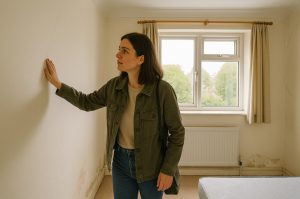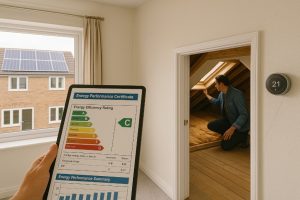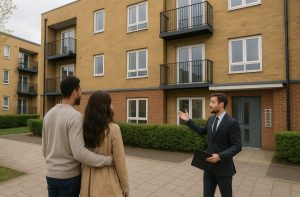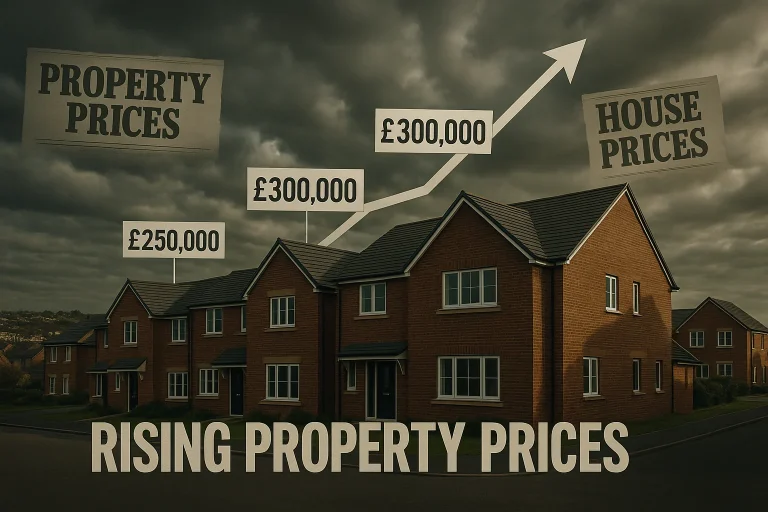Buying a home is likely one of the most significant financial decisions a person will make. While the process of finding a dream property can be exciting, it also carries potential risks.
Knowing what to ask when viewing a house to buy is essential to avoid unexpected issues later.
By asking the right questions, prospective buyers can protect their investment, uncover hidden red flags, and ensure the property meets their needs both practically and financially.
This guide outlines 30 smart questions every buyer should ask at various stages of the house viewing process.
Why Asking the Right Questions During a House Viewing Matters?
House viewings offer a limited window of opportunity to understand a property’s condition, value, and suitability.
A buyer may only spend 30 minutes walking through a home, yet is expected to make a life-altering decision based on that visit.
Asking the right questions ensures:
- Critical information is uncovered
- Costs such as repairs or legal issues are avoided
- A buyer has leverage for price negotiations
- Confidence in making or rejecting an offer
Estate agents and sellers may not always offer complete transparency, so being proactive with questions is essential.
Key Questions to Ask Before the Viewing

Before arranging a physical viewing, it’s important to gather as much contextual information as possible.
Speaking to the estate agent in advance or researching the property online can reveal potential dealbreakers early and save time.
These pre-viewing questions also help buyers narrow down options, particularly if they’re looking at several properties in a short time frame.
1. Is the property freehold or leasehold?
Understanding the property’s tenure is fundamental. A freehold property means the buyer owns both the property and the land it sits on, while a leasehold means ownership is limited to a set number of years, and ground rent or service charges may apply. This distinction affects long-term costs and responsibilities.
2. How long has the property been on the market?
A property that has been listed for several months (or longer) could indicate issues such as overpricing, structural defects, or a lack of interest.
If it’s been on the market for a long time, buyers might have more room to negotiate on price or ask why previous interest didn’t result in a sale.
3. What is the seller’s reason for moving?
Understanding the seller’s motivation can help buyers tailor their offer. If the seller is relocating for work or looking to downsize quickly, they may be more open to negotiation or faster completions.
4. Have there been any price reductions since listing?
If the asking price has dropped over time, it may indicate difficulty in selling due to market conditions or feedback from previous viewings. It could also suggest that the seller is now more realistic or motivated.
5. Are there any known issues with the property or legal complications?
Ask upfront if the estate agent is aware of any complications, such as boundary disputes, unauthorised extensions, or ongoing litigation. This gives you an early indication of potential red tape before progressing to legal checks.
In summary, asking these questions before even stepping foot inside the property provides clarity and confidence.
It helps buyers decide whether a property is worth viewing in person, and prepares them to ask deeper follow-up questions during the visit.
What to Ask the Estate Agent During the Viewing?

Once at the property, the estate agent becomes a key source of information. Although they represent the seller, they are legally obligated to disclose material facts that may affect a buyer’s decision.
A buyer’s goal during the viewing is to look beyond aesthetics and marketing, and gather insights about the property’s history, market activity, and sales potential.
1. What’s included in the sale?
Fixtures and fittings can vary widely between sales. Clarify what comes with the property—this includes kitchen appliances, garden sheds, curtains, blinds, or furniture. Sometimes these details can affect the final value of the offer or the need for additional investment post-purchase.
2. How many viewings has the property had?
A property with a high number of viewings and no offers may suggest hidden issues. Conversely, low viewing numbers could indicate limited demand or that the price is unrealistic for the area.
3. Have any offers been made?
Knowing whether other offers are on the table helps buyers understand the competition. It can influence how quickly they need to act or whether they should consider offering close to the asking price.
4. Has the property ever been under offer and fallen through?
If the property was previously under offer but the sale didn’t complete, find out why. It may be due to legal issues, failed surveys, or buyer financing problems. This insight can help buyers prepare or proceed with caution.
5. Is the seller part of a property chain?
A chain can significantly impact how quickly a transaction can proceed. If the seller is in a long or complicated chain, delays are more likely. Alternatively, if the seller has already vacated the property or is chain-free, completion may be faster and smoother.
Additionally, it’s wise to ask if the seller is flexible with their timeline or if they have specific conditions, such as a preferred move-in date.
These viewing-day questions help buyers dig beneath the surface, assess transparency, and gather the facts necessary to make an informed decision. They also provide leverage in negotiation and can help uncover red flags that might not be visually apparent during a brief inspection.
Property Condition Questions to Ask During a Viewing

During a property viewing, it’s easy to become distracted by decor, space, and layout. However, one of the most critical parts of the viewing process is assessing the physical condition of the property. Visual appearances can sometimes hide underlying issues, so buyers need to approach viewings with a critical eye and a set of prepared questions.
1. Are there any visible signs of damp, mould, or water damage?
Damp can cause long-term damage to the structure of a property and pose health risks. Look out for discoloured patches on walls or ceilings, peeling wallpaper, musty smells, and black mould—especially around windows, in corners, or in bathrooms. Ask the estate agent if any known damp issues have been treated and what caused them in the first place.
2. When were the plumbing, boiler, and electrics last serviced or updated?
A home’s plumbing and electrical systems are essential for safe and comfortable living. An outdated electrical system may not support modern appliances and could fail safety inspections. Boilers should be serviced annually, and you should ask if there are service records available. A replacement boiler or updated electrics could save you from a large expense after purchase.
3. Has the property undergone any major renovations or structural work?
While renovations can add value, they can also create complications if not completed to regulation standards. Ask for documentation of planning permissions, building regulation approvals, and guarantees for any extensions or loft conversions. It’s important to confirm that all work has been carried out legally and professionally.
4. What is the current condition of the roof, windows, and guttering?
Replacing or repairing roofs and windows can be a significant cost. Ask the agent about the age of the roof and whether any repairs have been done recently. Check whether windows are double glazed, if any seals are broken, or if frames are rotting (particularly in older homes). Look up to see if gutters are leaking, detached, or clogged.
5. Is there any evidence of pest infestations or previous treatments?
Pest problems can persist long after an infestation is cleared. Signs of rodents, insects, or birds may include droppings, chewed materials, or unusual noises in the walls or loft. Ask whether pest control has been carried out and whether the issue was fully resolved.
By asking these questions, buyers can better assess whether the home is move-in ready or if it may require repairs that could affect their budget or timescale.
Energy Efficiency and Running Costs

Beyond the purchase price, one of the most overlooked aspects of buying a property is the ongoing cost of living in it. Energy efficiency plays a major role in this. Well-insulated, efficient homes are more comfortable to live in and significantly cheaper to run.
1. What is the Energy Performance Certificate (EPC) rating?
Every property on the market must have an EPC, which rates the energy efficiency of the home from A (most efficient) to G (least efficient). Ask to see the EPC report, which not only shows the current rating but also outlines recommended improvements and potential future savings.
A poor rating might indicate the property requires investment in insulation, double glazing, or heating systems. Conversely, a high rating can suggest lower utility bills and a more eco-friendly home.
2. What are the average monthly energy bills?
Ask the seller or agent for a breakdown of utility costs, including gas, electricity, and water. Keep in mind that usage will vary depending on the size of the household, but this gives a useful estimate. Older homes or those with outdated heating systems can be much more expensive to run.
3. Is the insulation up to modern standards?
Proper insulation (loft, wall cavity, and sometimes underfloor) plays a critical role in keeping a home warm in winter and cool in summer. Poor insulation can significantly increase heating bills. Ask if the property has undergone recent insulation upgrades and whether any government grants or schemes have been used to fund improvements.
4. Are the windows double or triple glazed?
Double glazing improves thermal efficiency and reduces noise pollution. It’s also a key feature that contributes to better EPC ratings. Triple glazing is less common but offers even better performance. Ask whether all windows are modern and if any frames are damaged or in need of replacement.
5. Are there energy-efficient systems or smart technology installed?
Some homes include energy-saving technologies such as smart thermostats (e.g. Hive, Nest), solar panels, underfloor heating, or low-energy lighting. These can increase comfort and reduce utility costs. Ask for details on what has been installed and whether the systems are included in the sale.
Understanding the energy efficiency of a property isn’t just about monthly costs—it’s also increasingly important from a resale and sustainability perspective. Homes that are cheaper to run and environmentally friendly tend to perform better in the market and attract future buyers.
Questions to Ask About the Local Area

The saying “location, location, location” remains true in property buying. Even the most impressive home can lose its appeal if it’s located in a problematic area.
A property’s surroundings influence lifestyle quality, resale value, and long-term satisfaction. When viewing a home, it’s just as important to assess the neighbourhood and community as it is to inspect the property itself.
Here are the most important questions to ask about the local area:
1. What schools are nearby and how are they rated?
For families or buyers planning to start a family, school quality is a top consideration. Ask which schools the property falls within the catchment area for and what their Ofsted ratings are. Even if the buyer doesn’t have children, good local schools can increase a property’s value and appeal when it comes time to sell.
2. Are there nearby public transport links or major roads?
Good transport connections affect daily convenience and commute times. Ask how close the property is to the nearest train or tube station, bus stop, or major roads like the M25. Also consider travel times to the city centre or major employment hubs. Limited or unreliable transport could affect accessibility and future market value.
3. What local amenities are within walking or short driving distance?
Shops, post offices, GP surgeries, pharmacies, and leisure facilities all contribute to the liveability of an area. Ask the estate agent or seller what’s available nearby and ideally take time to walk around the neighbourhood before or after the viewing.
4. What is the local crime rate?
Safety is a key concern for all homeowners. Ask the estate agent if the area is generally considered safe, and supplement this with online crime statistics or neighbourhood watch data. Also, talk to nearby residents or observe the area at different times of the day.
5. Are there any planned developments or infrastructure projects nearby?
Major construction projects can temporarily disrupt the area and may change its character or increase congestion. However, regeneration schemes can also enhance property values. Ask whether there are upcoming housing developments, new roads, or commercial projects planned in the vicinity, and how they might impact the property long-term.
In addition to these questions, it’s useful to visit the area during different times—weekday mornings, evenings, and weekends—to get a well-rounded feel for noise levels, traffic, and general atmosphere. A home isn’t just four walls—it’s the community around it that shapes everyday living.
What to Ask When Viewing a Flat or Leasehold Property?

Buying a flat or a leasehold property in the UK introduces additional complexities that don’t typically apply to freehold homes. Leasehold ownership means that the buyer only owns the property for a set period (the length of the lease), and must pay annual service charges, ground rent, and possibly contribute to building maintenance. Understanding these terms and obligations is critical before making an offer.
Here are the essential questions to ask when viewing a flat or leasehold property:
1. How many years are left on the lease?
This is perhaps the most important question. A lease of fewer than 80 years can significantly reduce a property’s value and make it difficult to secure a mortgage. Extending a lease can be expensive, especially once it drops below 80 years due to “marriage value.” Ideally, the lease should have at least 90–100 years remaining.
2. What are the annual service charges and ground rent?
Flats typically come with service charges that cover shared areas, such as stairwells, lifts, gardens, and building insurance. Ask for a breakdown of these charges and whether they’ve increased in recent years. Ground rent is often a separate fee paid to the freeholder. Be wary of ground rents that escalate quickly over time, as this can be problematic for future resale or remortgaging.
3. What does the service charge include?
Not all service charges are equal. Some may include cleaning, maintenance, communal heating, building insurance, or even concierge services. Clarify exactly what you’re paying for and whether services provided align with the cost. Also, ask about the frequency and reliability of these services.
4. Are there any major works planned for the building?
Large residential blocks sometimes undergo major repair or refurbishment work, such as roof replacements or lift upgrades. These can result in substantial one-off charges, often running into thousands of pounds. Ask if any upcoming works have been proposed or approved and whether you’ll be expected to contribute. Check if a sinking fund exists to cover large costs.
5. Are there any restrictions within the lease?
Lease agreements often include specific conditions known as “covenants.” These might prohibit subletting, running a business from the property, keeping pets, or making alterations without consent. It’s crucial to know what you can and can’t do with the flat. Violating lease terms can lead to fines or legal action from the freeholder or managing agent.
Other worthwhile questions include:
- Who manages the building—an external company, the freeholder, or a resident management committee?
- Have there been any disputes between leaseholders and the freeholder?
- Are there noise issues between flats?
By thoroughly questioning the terms and financial obligations of leasehold ownership, buyers can avoid unexpected costs and legal limitations. Leasehold ownership can be entirely manageable, but it requires full transparency before proceeding with a purchase.
Red Flags to Watch Out For

Not every problem with a property is immediately obvious—especially if it has been professionally staged or recently decorated for viewings. While some issues may seem cosmetic, others can be indicative of costly or serious structural defects. Buyers should approach every viewing with a critical eye, asking questions and making careful observations.
Here are some of the key red flags to be aware of:
1. Are there any large cracks in the walls or ceilings?
Hairline cracks in plaster are usually harmless, especially in older properties, but wide or uneven cracks can indicate subsidence or movement in the building’s structure. Pay attention to cracks around windows, doorframes, and in ceilings. If anything looks concerning, a structural survey may be necessary before proceeding.
2. Are strong air fresheners or scented candles being used excessively?
While it’s common for sellers to try and make a property smell pleasant, an overuse of air fresheners or scented candles could be a sign they’re attempting to mask damp, mildew, smoke, or pet odours. Be sure to rely on your own senses—especially in closed spaces like cupboards, under sinks, and lofts.
3. Do any rooms feel unusually cold or musty?
Cold or damp rooms might suggest insulation problems or inadequate heating. A musty smell can also indicate underlying damp that may not be visible. Pay attention to basements, utility rooms, and rooms with external walls, as these are common areas for such issues.
4. Is the exterior of the property in poor condition?
Sometimes the exterior tells you more than the interior. Broken roof tiles, sagging gutters, flaking paint, or cracks in brickwork are all warning signs. These might seem cosmetic but could also suggest lack of general maintenance, which could mean hidden issues elsewhere.
5. Are there signs of ongoing neighbour disputes or noise issues?
Listen for excessive noise from adjoining properties and look out for any visible signs of neighbour conflict, such as unkempt shared spaces, fences with warning signs, or comments from the agent that hint at difficult residents. Ask directly if there have been any neighbour-related complaints or legal issues.
Buyers shouldn’t feel rushed or pressured during a viewing. Take the time to test taps, windows, light switches, and even floors. If anything seems too polished or if the agent avoids answering a question, make note of it and seek clarification during a second visit or from a solicitor.
Spotting these red flags early can save significant costs and complications later in the buying process.
Post-Viewing Questions to Consider Before Making an Offer

After the viewing is over, it’s tempting to act quickly—especially in a competitive market. However, taking time to reflect and ask follow-up questions can ensure a buyer is making an informed and confident decision. These questions help confirm if the property truly meets expectations and whether it’s a financially viable purchase.
1. Have there been any previous surveys or valuation issues?
Ask if the property has previously been surveyed or valued, especially if a previous sale fell through. If a lender down-valued the property or a survey revealed structural issues, that information should be disclosed and can significantly impact negotiations or the willingness to proceed.
2. Is the seller open to negotiation on the asking price?
Some sellers set firm prices, while others are more flexible—especially if the property has been on the market for a while or there’s a pressing need to move. Understanding the seller’s position can help you formulate a competitive and realistic offer.
3. Has the seller found a property to move into?
If the seller is actively in a chain, it might affect the timeline for completion. If they haven’t found anywhere to move yet, there may be delays. On the other hand, a seller with no ongoing chain might prioritise a faster sale, which could benefit buyers in a strong position.
4. Are there any nearby planning applications or developments?
It’s worth checking with the local council or online planning portals to see if there are any major construction projects planned nearby. These can affect your views, create noise during the day, or even devalue the property if they result in overcrowding or loss of green space. Ask the agent if they are aware of any approved or pending applications.
5. What is the expected timescale for exchanging contracts and completing the sale?
Get clarity on the seller’s desired timescale and whether they can accommodate your own. Some buyers require a quick sale, especially if they’re relocating for work, while others may need more flexibility due to personal circumstances. Confirming the timeline helps avoid surprises and gives you time to arrange legal, financial, and logistical details.
Additional follow-up actions may include:
- Requesting a second viewing
- Asking to see any warranties, certificates, or planning permissions
- Clarifying boundaries and shared access routes
- Consulting with your mortgage adviser and solicitor
Post-viewing questions are a buyer’s final opportunity to ensure there are no hidden concerns or unresolved doubts. Don’t be afraid to ask for documentation, raise concerns, or take your time. Informed decisions make for smoother purchases and greater peace of mind.
30 Key Questions to Ask When Viewing a Property:
| Section | Key Questions |
| Before Viewing | Freehold/leasehold? Time on market? Seller’s reason? Issues? |
| During Viewing | What’s included? Offers? Chain status? Past buyers? |
| Condition | Damp? Roof? Boiler? Renovations? Windows? |
| Energy | EPC rating? Utility costs? Insulation? Smart meters? |
| Local Area | Schools? Transport? Amenities? Crime? Developments? |
| Leasehold | Lease length? Charges? Restrictions? Planned works? |
| Red Flags | Cracks? Damp smells? Poor maintenance? |
| After Viewing | Survey concerns? Offer flexibility? Timeline? Plans nearby? |
Conclusion
Buying a property is a major commitment and asking the right questions at every stage can make all the difference.
While not every answer may lead to a dealbreaker, understanding the full picture gives buyers greater confidence, helps avoid nasty surprises, and creates an opportunity to negotiate more effectively.
Buyers are encouraged to take a checklist, note down answers during the viewing, and seek advice from a solicitor or surveyor when necessary. A well-informed buyer is always better positioned to make a wise investment.
FAQs
How early in the process should you prepare your questions?
Buyers should prepare questions as soon as they schedule the viewing. Researching the property listing and local area ahead of time makes the actual visit more productive.
What questions should first-time buyers prioritise?
First-time buyers should focus on affordability, condition, and energy costs. Questions about the roof, boiler, electrics, and EPC rating are especially important.
Should I ask the seller directly or only the agent?
Questions can be directed at either, but estate agents are legally required to disclose material facts. If the seller is present and willing to answer, it’s a valuable opportunity to gain insights.
How do I know if an estate agent is being honest?
Look for inconsistencies in their answers, cross-reference with online property details, and consider hiring a surveyor or solicitor for independent verification.
Can I revisit the property to clarify my questions?
Yes. It is common to schedule a second viewing to verify earlier impressions, especially if you’re seriously considering making an offer.
What’s the best way to follow up after a house viewing?
Email the estate agent with a summary of remaining questions or concerns. This creates a paper trail and allows the agent to consult the seller for accurate answers.
Should I bring a surveyor to the second viewing?
While not mandatory, bringing a professional early can help identify serious issues before making an offer, especially if you have doubts about the property’s condition.






